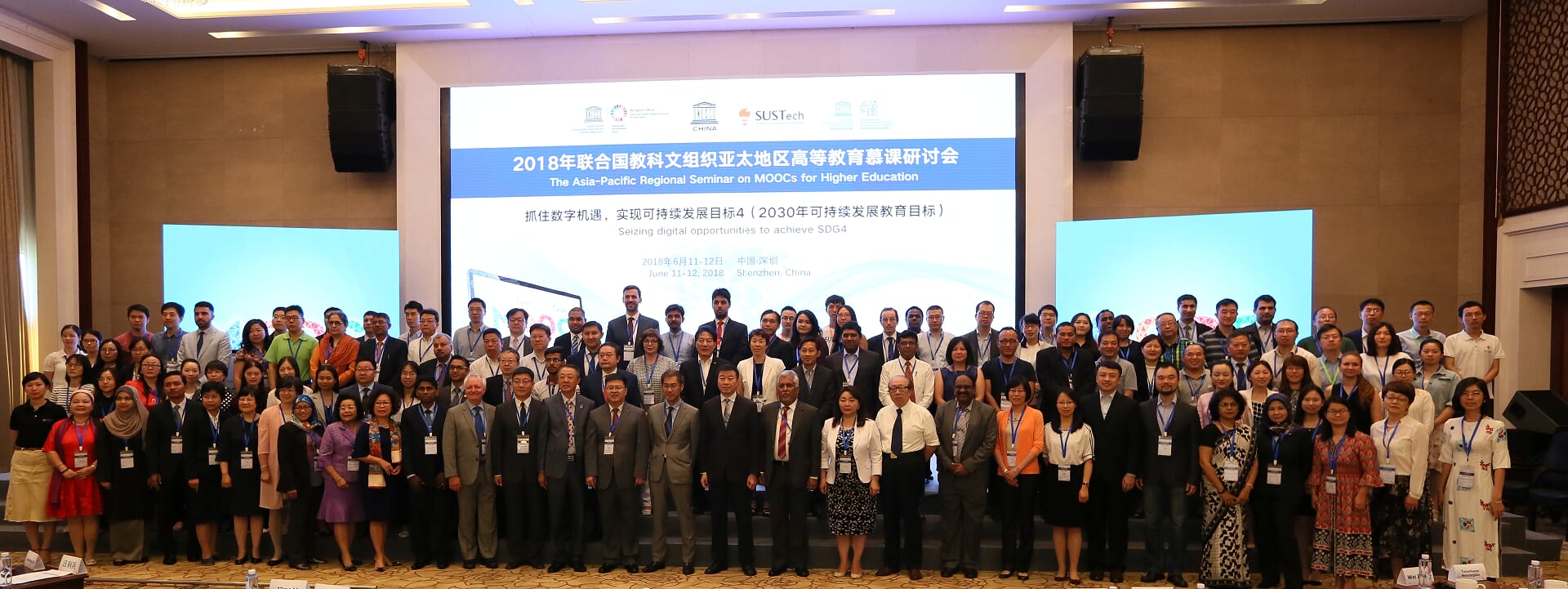
The University of the Philippines Open University (UPOU), represented by Dr. Joane V. Serrano, Director of the Information Office, participated in the Asia-Pacific Regional Seminar on Massive Open Online Courses (MOOCs) for Higher Education held at Shenzhen, China on 11-13 June 2018.
The congress, which gathered regional experts, policy makers, academics, researchers, entrepreneurs and post graduate students throughout the Asia and the Pacific, carried the theme, “Seizing digital opportunities to achieve Sustainable Development Goal (SDG) 4.” As stated by the United Nations, the aim of SDG 4 is to “ensure inclusive and equitable quality education and promote lifelong learning opportunities for all.” The seminar was organized by UNESCO Asia and Pacific Regional Bureau for Education, Bangkok, Thailand in cooperation with the National Commission of the People’s Republic of China for UNESCO and the Southern University of Science and Technology (SUSTech), Shenzhen, People’s Republic of China. The seminar was hosted by the International Center for Higher Education Innovation under the auspices of UNESCO (ICHEI), Shenzhen, People’s Republic of China.
The aim of the regional seminar on MOOCs was to develop a research framework to map innovative policies and practices to ensure equal access to quality higher education. The seminar focused on a number of specific objectives. It highlighted state-of-the-art technologies from the public and private sectors to enhance the quality of teaching and learning in higher education. It also identified strategies to strengthen institutional governance and partnerships for technology-enriched learning to reach the most vulnerable in Asia-Pacific. The seminar also convened experts from national platforms to exchange experiences and assess readiness for a regional network on MOOCs in Asia Pacific. Lastly, it aimed to develop a research framework for a new flagship publication to analyze gaps and opportunities for MOOC policies and practices to achieve SDG 4.
The seminar focused on talks from different key stakeholders. The first session focused on taking stock of progress in higher education. It raised awareness about the urgent need for innovative policies and practices of MOOCs to achieve global goals – SDG 4. It was followed by a panel discussion on developing national strategies for MOOCs. The panelists from Cambodia, China, India and Korea shared the challenges of developing and sustaining national strategies on MOOCs for higher education, and shared insights to promote innovation and effective policies. Then, a panel discussion on promoting innovation through MOOC portals was carried out. The panelists from Afghanistan, China, Japan and Thailand shared strategies to promote the development of MOOC portal and their assessment of the readiness for a regional network in Asia-Pacific. Session 4 was a panel discussion on enablers and barriers that influence institutional partnerships, programmes and services around MOOCs. The panelists from Australia, China and Mongolia shared strategies and practical experiences to strengthen institutional governance and how to drive institutional change to support next generation learners. Another highlight of the seminar was a youth forum which focused on MOOCs for lifelong learning. The youths from different sectors such as eLearning NGO, Beijing Institute of Technology, United Network of Young Peacebuilders, YouthLEAD and Y-PEER shared their experiences with MOOCs and explored student perceptions of barriers and opportunities for lifelong learning. The first part of the seminar was concluded with the breakout discussions, which were divided into several topics to promote understanding of how MOOCs can serve diverse stakeholders and strengthen collaboration across sectors: (1) Policy-level, (2)National MOOC platforms, (3) Institutional level, (4) Youth and adult learners, and (5) EdTech and cross sector partnerships.
The second part, which comprised the last day of the seminar, was a regional meeting of selected policy makers, academics, and managers involved in MOOCs.The meeting focused on two agenda. One is the setting up a regional network of MOOCs and the other was about Research focus and framework.
Dr. Joane V. Serrano represented UPOU in this seminar on behalf of Dr. Melinda dela Peña Bandalaria, UPOU Chancellor and President of the Asian Association of Open Universities (AAOU). As the country’s pioneer on MOOCs with free courses offered via model.upou.edu.ph, UPOU is committed to continue in improving and expanding its MOOC offerings. (ACDelValle)








